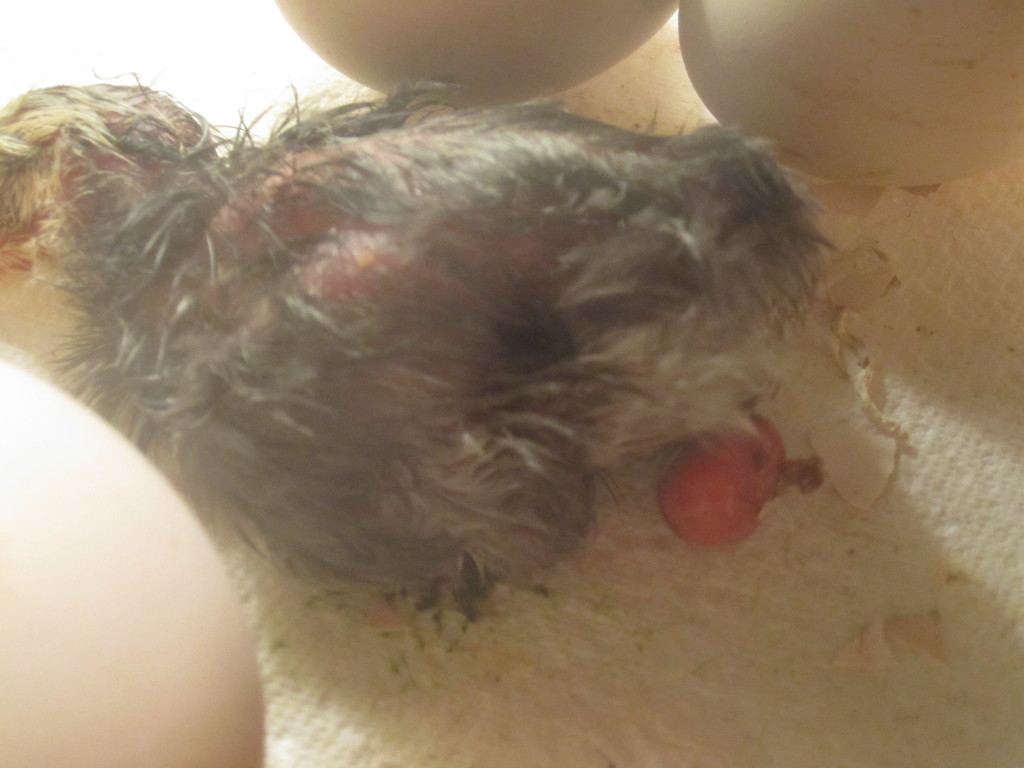despite having a really great hatching experience for our first batch of chicks, there were still some anomalies in our new population of chicks. of course we’ve had some chicks who took longer to hatch then others, or some chicks that appear to be smaller (a little more runty) than the others, but this is to be expected. no chick is the same, of course!
beyond these “average uniquenesses” among our chicks, three particular anomalies stand out from this experience:
- a chick born with part of her yolk sac unabsorbed
- a chick born with an underdeveloped leg
- a chick that actually needed help hatching
i want to describe these three different anomalies and how we’ve dealt with them/plan to deal with them. this post focuses on the first…
anomaly #1
the fourth chick that was born hatched with part of its yolk sac unabsorbed. i’ve mentioned this in previous posts about the chicks, but i’ll explain again… during the last few days of incubating, the chick begins to absorb the yolk sac that was external throughout the others stages of their development. they absorb it into their abdomen region and this allows them to last without food or water for a few days after they hatch. it also gives them the extra energy that they need to start pipping through their shells and busting into the world (a tiring task indeed). sometimes a chick’s timing if off and they hatch out before their bodies are actually ready. this happens way more often in artificially incubated eggs than eggs hatched under mother hens. another testament to nature always being better…
perhaps it was the temperature of the incubator or a temperature or humidity fluctuation that caused this one chick to think that it was the right time to be born, but part of the yolk was still dangling from its abdomen when it hatched.
this chick acted totally fine and healthy after being born, but after doing some research we determined that it was best to keep her separate from the others until her dangley bits dried up and fell off. we did this for a day or two and gave her separate food and water.
the video above shows the chicks when they were about three days old, and you can see the little chicken in her own box under the heat lamp. if you look closely, you can see part of her yolk sac hanging underneath her.
after keeping her in her box for a few days, her yolk sac area was still not drying well and the areas was starting to smell very bloody. her sac was also beginning to partially dry against her stomach, and that whole area seemed sticky. she also seemed really “cheepy” (noisy and restless) and i became worried that she might get an infection in that area. i decided to apply some plaintain on her stomach and so i chewed up a batch and spit it on her stomach area.
we have no way of knowing if getting chilled, or refusing to eat and drink, or simply being sick was the reason why she died, but when i woke up the next morning i saw that she had died. later we put her in the wood stove so she could be cremated (this just seemed like a better idea in the winter than a burial).
another lesson learned from the animal world: not all things live. and although her death made me sad, i knew in my gut early on that she was probably going to die because of her birth defect. some things live and some things die, as always, and having 21 lively, goofball chicks running around as i write this, i am reminded that nature really has a great plan set up for living.
.:.

March 23, 2016 at 12:54 am
I’m going through this right now with my duck, i’m noticing the restlessness and different chirping as well. I’m just holding her while she trys to sleep and hoping for the best. Poor things to have to go through such an experience at such young ages :( Thanks for sharing about your experience with the Unabsorbed Yolk Sac as well. Gave me ease that mines doing the same as yours, in the same situation, am going to hope for the best but prepared for the opposite as well. Hope your other chickens grew up great for you! Peace
April 4, 2016 at 3:52 pm
Thank you for your comment! I hope that your duck recovered and that you’ve had great luck raising your other animals. We’re so happy our post helped you, even in the smallest way. ;)